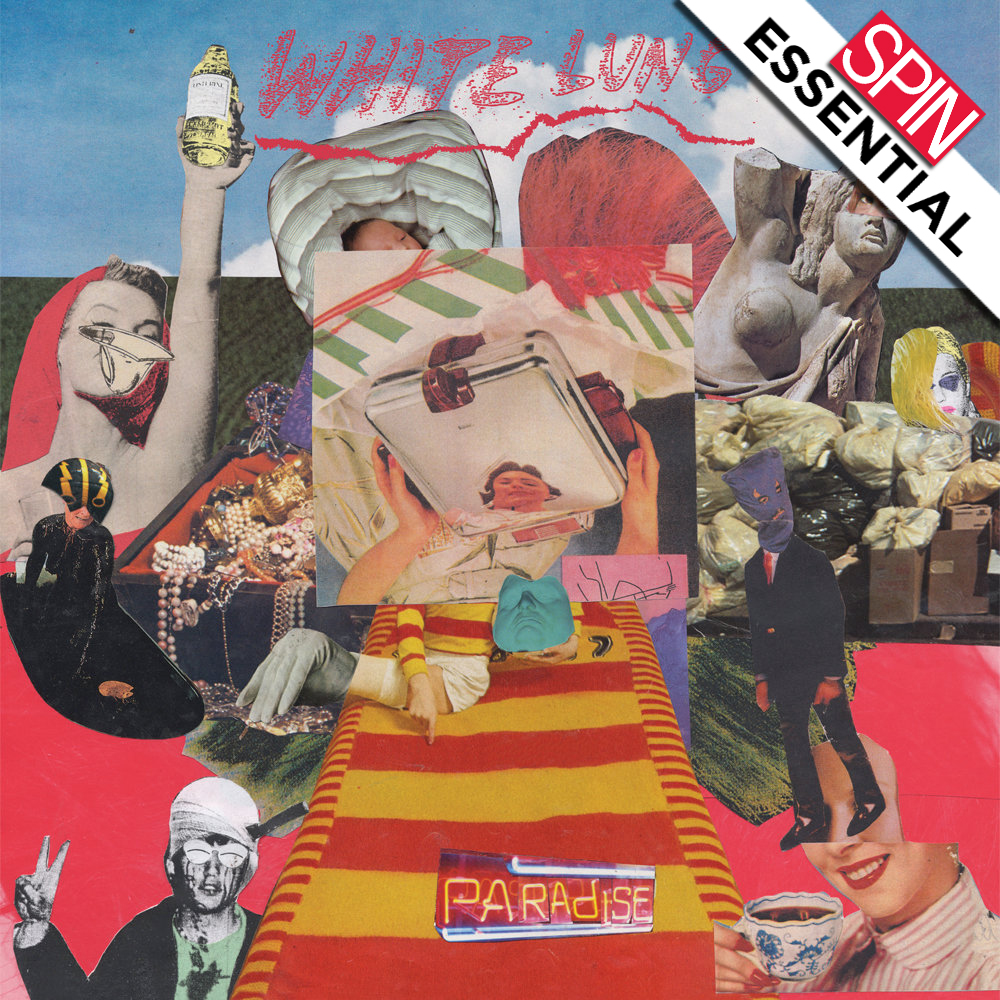Release Date: May 06, 2016
Label: Domino
“Expansive” is the wrong word to describe a viciously focused, 29-minute album, but White Lung‘s fourth full-length is an evolution in every direction. The breakneck Vancouver quartet’s latest effort packs knotty instrumentation and glinting, steel-edged melodies, pierced by hints of ’00s radio rock and singer Mish Barber-Way’s dry sneer. Passionate by rarely loving, Paradise works on a higher conceptual level as well; Barber-Way’s side gig as a journalist and advice columnist has broadened her perspective and solidified her voice in a way few lyricists get to experience. The follow-up to 2014’s bracing Deep Fantasy continues to professionalize White Lung’s sound, and the resulting cyclone powers a band with even greater ambitions in mind.
The band chose producer Lars Stalfors (the man behind dark, warped albums by Chelsea Wolfe and HEALTH), because they wanted a “modern” sound for Paradise. Modern means clean, and modern means loud; White Lung have never had any trouble with volume, but Paradise brings new polish. Guitarist Kenneth William made a point of composing each song in a different key, and the band has refined their pacing without sacrificing momentum. “Below,” a ballad that could easily be another band’s fast song, highlights piercing guitar work that wouldn’t sound out of place on the new Deftones record. In Stalfors’ hands, the songs’ muscles grip closer to the bone and wildly zigzagging riffs are thrown into sharp relief. The sonic variety gives Paradise a more distinctly faceted sound than any of White Lung’s previous albums, even if you’re not consciously aware of why each track seems to ring with a unique echo.
The skillful construction and principled production are two reasons Paradise feels simultaneously thorny and listenable; another is the strength of its emotional trajectory. The pent-up frustration of opener “Dead Weight” gives way to “Narcoleptic,” a brutal awakening that fuels the furious energy of the eight tracks to follow. “Watch my blue turn red,” the narrator threatens, her ire invoked. “Take him down / With the lead he built into your crown,” she commands, fantasizing revenge. William’s ferocious guitar arrangements lead the choruses, matching Barber-Way punch for punch.
There’s no one literal reading of Paradise; part of the album’s story is Barber-Way’s invention of new roles for herself. Several songs are told from the perspective of specific characters — some relatable, some awful. “Kiss Me When I Bleed” casts her as a young woman in a sinkhole of harsh circumstances and obsessive passion. “I will give birth in a trailer / Huffing the gas in the air / Baby is born in molasses / Like I even care,” she belts. It’s an un-beautiful line, exploiting taboos about bad mothering and the unkind habit of passing judgement on who has children and who ought not. It’s also one of the album’s most anthemic choruses, matched in intensity by a squealing bridge. There’s a universality to it; “kiss me when I bleed” is at once a human and explicitly feminine demand.
You could fairly compare this moment in White Lung history to the Emily Haines and Metric of ten years ago, fresh off the release of 2005’s Live It Out. Metric had pedigree as offshoots of Broken Social Scene, but they also had satellite-radio-ready singles, an established fanbase, and a charismatic frontwoman. Forget for a moment that Metric spent part of 2015 opening for Imagine Dragons; White Lung can now fairly lay claim to the kind of cultural relevancy Haines’ band once had.
Barber-Way is on a different path: outspoken, self-aware (“If I f**k up, that’s my problem,” she recently told Stereogum), possessing media savvy borne of experience on both sides. Her nonfiction writing is sensitive yet unapologetic, tackling loaded subjects like women serial killers and men who won’t eat pussy. Alongside Perfect Pussy‘s Meredith Graves, Barber-Way is closing the gap between punk’s airing of grievances and journalism’s examination of them, carving a niche as a (song)writer who can convincingly prioritize social message alongside music.
If White Lung seize their commercial potential — they’re certainly capable — they’ll have to keep sticking the tricky balance between raw energy and hooks that don’t alienate their noise-loving early adopters. Paradise lands closer to technical brilliance than emotional resonance, but you can feel the band reaching. On the titular closer, they nearly capture it. At its heart a traditional punk ripper, “Paradise” conveys in a few phrases an animalistic and trusting love: “We’ll go so very far / They’ll never hear our copulating.” Consequently, the song with the fewest pyrotechnics here is worthy of as many repeat listens as the barnburners. Throughout Paradise, the cure for pain is bitter medicine — and its title track is a reminder that things aren’t always so bleak as they first sound.





